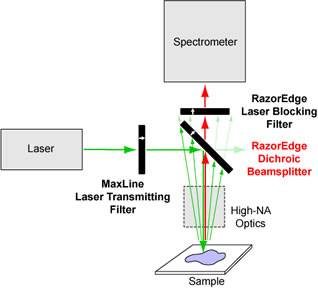
Life Science Optics

 Raman spectroscopy allows for the detection and identification of molecules through their unique vibrational and rotational energy level structure. As opposed to fluorescence methods, which require the addition of a separate
fluorescing molecule as a “tag” attached to the actual molecule of interest, Raman spectroscopy allows direct detection of a molecule with no chemical alteration. Another important difference, however, is that the scattered Raman signal
(as a percentage of the excitation power) is several orders-of-magnitude weaker than the corresponding fluorescence signal. Because of this, lasers are typically used as excitation sources to provide high power in a tightly focused spot, and very
sensitive detectors are used to detect the very faint signal. Excellent filtering is therefore essential to block the very intense laser light while still allowing high transmission of the slightly wavelength-shifted Raman scattered signal.
Raman spectroscopy allows for the detection and identification of molecules through their unique vibrational and rotational energy level structure. As opposed to fluorescence methods, which require the addition of a separate
fluorescing molecule as a “tag” attached to the actual molecule of interest, Raman spectroscopy allows direct detection of a molecule with no chemical alteration. Another important difference, however, is that the scattered Raman signal
(as a percentage of the excitation power) is several orders-of-magnitude weaker than the corresponding fluorescence signal. Because of this, lasers are typically used as excitation sources to provide high power in a tightly focused spot, and very
sensitive detectors are used to detect the very faint signal. Excellent filtering is therefore essential to block the very intense laser light while still allowing high transmission of the slightly wavelength-shifted Raman scattered signal.
Semrock stocks the widest selection of Raman-spectroscopy edge filters available, with edge wavelengths from 224 to 1550 nm. These filters are so steep and highly transmitting that they out-perform even the leading holographic notch filters, yet are less than half the price. Now you can see the weakest signals closer to the laser line than you ever have before. With their deep laser-line blocking, ultra-wide and low-ripple passbands, proven hard-coating reliability, and high laser damage threshold, they offer performance that lasts.
For preventing laser light from reaching the detector and drowning out the relatively weak Raman signal, we offer a collection of both single-notch filters and multi-notch filters, which block one or more laser line while transmitting light on both sides. For the most discriminating Raman measurements, eliminate laser spectral noise leakage by cleaning up your laser spectrum with a matched MaxLine™ laser clean-up filter.
Filter Types for Raman Spectroscopy Applications
Thin-Film Filters for Raman Spectroscopy from the December 2004 issue of Spectroscopy